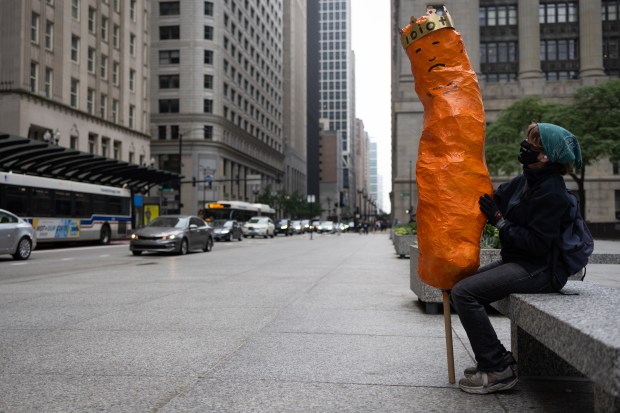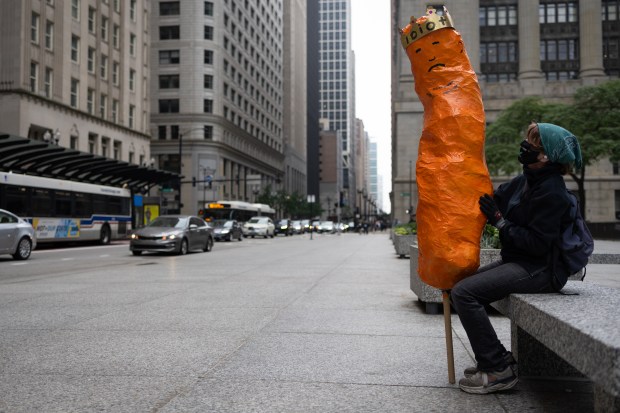Blue Island voters supported limiting the number of gaming cafes, but were split on whether to make Western Avenue a two-way street between 127th Street and Grove Street in nonbinding advisory referendums Tuesday.
The referendum to limit gaming cafes received 76% support, according to unofficial results. The referendum to ask the state to convert Western Avenue to a two-way street was nearly split, with 49.3% in favor and 50.6% against, unofficial results show.
Out of more than 12,300 registered voters in the city, only 906 cast ballots this election, according to the Cook County clerk’s office. Mayor Fred Bilotto, elected in 2021, and his Party for Blue Island slate ran uncontested.
Bilotto said the nearly split response on converting Western Avenue will inform discussions on the topic.
The city reached its cap on gaming cafes, Bilotto said, but with frequent requests from business owners and developers to open new ones, the City Council sought community feedback before considering expansion.
“In this case, voters sent a clear message that they don’t have a desire for new gaming cafes,” Bilotto wrote in a statement to the Daily Southtown.
Blue Island started allowing video gaming in 2012, just a few years after Illinois legalized video gambling machines in establishments that serve alcoholic drinks, including bars, truck stops and fraternal and veterans organizations, according to the Illinois Gaming Board.
Fourth Ward Ald. Bill Fahrenwald said almost every retail business in the city has video gambling machines.
“One thing we try to do in all of our efforts with zoning and approving business and so forth is to keep it a good mix of business in town,” Fahrenwald said. “And we just basically have enough of them. We just want to kind of make sure that we leave stores open for other businesses.”
Allowing video gaming is up to the municipality, and councils can decide to pass an ordinance prohibiting video gaming if they choose, according to the gaming board. A county board may pass an ordinance prohibiting video gaming within unincorporated areas.
The city has raked in more than $3.7 million in tax revenue from 52 establishments, according to revenue data from the gaming board.
The state share is much larger.
Blue Island gaming establishments have contributed more than $20.9 million to state coffers since the city started allowing video gambling, the data shows.
Fahrenwald said the council will look at setting a limit on gaming cafes, but he said existing cafes will stay. The key question will be how many more the city allows, and whether the council will replace any that close, he said.
“I also am aware that gambling is a problem for many people, so that’s always a concern. But it is legal, and it’s a very important source of revenue for some of our restaurants and food establishments and other places as well,” Fahrenwald said. “So you kind of have to try to balance the good with the bad.”
In the last year, people betting on video gambling machines in Blue Island spent nearly $114 million and establishments paid out $104 million in winnings, gaming board data shows.
Revenues are shared equally between retailers who furnish and maintain machines and establishment operators, with the split based on “net terminal income,” or NTI. The NTI for the 12 months ending March 31 was nearly $10.7 million and the state collected 30% of that, or $3.2 million.
In the last year, Blue Island reported 187 video game terminals at 33 establishments bringing the city about $546,000, the gaming board’s data shows. By law, each establishment may have up to six terminals.
While most towns in the Southland have chosen to allow video gambling, some, such as Palos Heights, Palos Park and South Holland, have opted to prohibit it. Other towns, such as Matteson, set limits by allowing video gambling in businesses, but not in licensed truck stop establishments. In Crete, video gambling is prohibited in bowling alleys.
Frankfort also prohibits video gambling. However, in 2022, the Video Gaming Act was amended to allow fraternal and veteran establishments to apply for a video gaming license, even in municipalities where video gambling is banned.
smoilanen@chicagotribune.com




